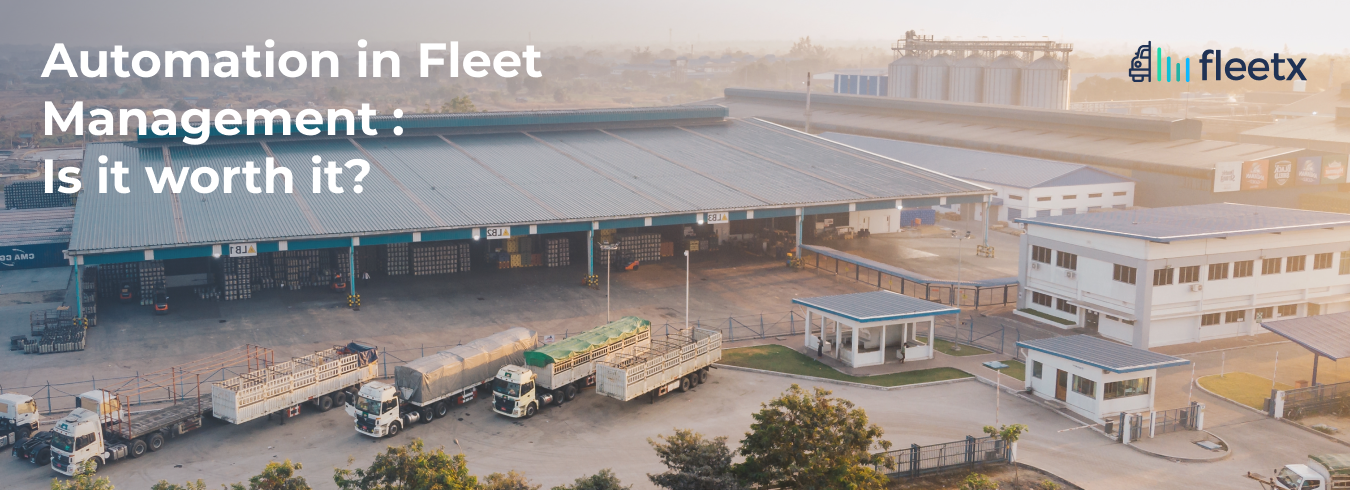
The most important quality for a fleet manager is efficiency. Let’s look at how can fleet managers be more efficient
In this article, we try to understand the role of a fleet manager and how fleet managers working for specific companies or fleet management service providers can use automation to make their life easier and work much more efficiently.
Fleet Managers are responsible for the entire operation of supply-chain management for their fleet. The responsibility comes with a unique set of challenges as management and execution that consists of tens or even hundreds of vehicles and drivers on road 365 days a year delivering goods and services requires a lot of work. These challenges can range from minor rerouting, 24x7 availability on phone calls to major setbacks like delayed delivery, theft and, higher fuel expense which can disrupt the entire budget.
Fleet Managers are expected to deal with these everyday challenges as part of their role. However, with a few steps and changes they can even avoid these challenges or atleast get a much quicker resolution and increase their efficiency.
How to be a better Fleet Manager?
No two fleets are alike, as any fleet manager will fully accept, the requirements for each of them varies. Apart from shifting to a more tech-oriented system of operations, Fleet Managers in their capacity can do certain things to increase their fleet’s efficiency and improve their overall TATs. Let’s have a look at some of the best practices fleet managers can do which can help them manage the fleet more efficiently while cutting costs and increasing profits.
Use a Real-Time fleet tracking technology for more efficient and accurate tracking
Automation helps reduce time while maintaining efficiency
Fleet management tech that helps in location analytics can greatly help fleet managers in running day to day operations, easily automating processes like Live Vehicle Tracking of their fleet and avoid 24x7 call follow-ups with each driver.
Real-Time route maps and previous Trip Insights can help fleet managers choose the most cost-friendly route for their trips, reducing Fuel Costs and Delivery Time for all the vehicles in their fleet. It helps drivers navigate correctly through the best route for their trips without depending on unclear directions which could lead to delays and end up costing more than it should.
Adding an efficient Fuel Management system can bring the Fuel Wastage down by upto 20%
Fuel cost is one of the largest components of operational cost
Fuel is easily the largest component of Operational Cost for any fleet operating business. Thus, managing it efficiently can save you a lot of money. The leading causes of high fuel costs are fuel leakages, idle engines leading to unwanted consumption, rerouting due to poor navigation and fuel thefts which can completely disrupt your fuel accounting and management. Most of these issues are avoidable. Fleet managers can educate drivers about reducing idle engine usages, educate them about fuel thefts and plan their route with the latest set of data in advance. Alternatively, fleet managers can use Fuel Management Systems which can collect and present accurate data on fuel usage and consumption for each vehicle in real-time. It also alerts fleet managers regarding the sudden drop in fuel capacity which can detect fuel thefts early and prevent fuel drain on the route and reduce fuel usage by up to 20%.
3. Regular maintenance of your fleet result improves vehicle longevity and saves you high repair cost
Scheduled maintenance improves a vehicle’s longevity and maintains the engine’s efficiency
When your vehicles do not receive timely maintenance and tune-up, it could cause a variety of problems like:
- High Wear and Tear of the vehicle reducing longevity
- Poor efficiency caused by more frequent breakdowns
- The added cost of purchase or lease of new vehicles
- The added cost of paying salaries to idle drivers
- The high cost of fuel due to poor engine efficiency
- And many more
When you manage a fleet of thousands of vehicles, it could get difficult to remember maintenance and servicing dates for each one. As a result, the lack of timely maintenance and tune-ups can result in large maintenance bills and, in the long run, cause poor engine performance increasing the Cost Per Kilometer for your vehicle.
Fleet managers should maintain timely maintenance and checkup for all their vehicles to prevent all of these things from happening. They could employ Fleet Maintenance Systems that not only helps fleet managers track and alert them regarding the maintenance of each vehicle in their fleet, it also provides reminders for service using real-time diagnostics based on usage. GPS enabled a quick response from nearby vehicle centres in case of breakdowns.
4. Taking charge of the situation and maintaining calm when resolving conflicts and disputes
A good fleet manager excels in the art of conflict resolution and takes charge
A good fleet manager has to constantly think on his feet and take on the spot decisions. Operating a large fleet comes with a large set of problems that could be encountered by drivers on route. Issues related to compliance, challans, rerouting, theft, etc a fleet manager has to be prepared to deal with all kinds of conflicts and issues aptly.
Driver Management Systems can help you store driver and vehicle documents avoiding heavy challans by authorities. One-click call buttons, delivery points using location analytics, a system for managing and faster payouts for transactions cost incurred by a driver can help create a more open and dispute free relationship between drivers and fleet managers, thus improving efficiency.
5. Always be punctual and manage your time better to be more efficient
Improved TATs and timely shipments form the crux of the client-service relationship
Modern Business runs on efficient and timely delivery of shipments, thus, it has become even more important to maintain timely delivery to maintain good client-service relations. Every fleet manager should aim to increase efficiency when it comes to fleet performance. Poor and delayed delivery can sour relationships with clients and eventually lose out to the competition. In Cold-Chain Fleet Management delayed deliveries can result in damaging of goods resulting in losses worth crores!
Being able to prioritise between fleet operation and upper management, a fleet manager should always be scheduled oriented. Everything we talked about above about Fleet Management Services has one fixed goal despite their objectives, that is, improving TAT and always delivering within the scheduled time. A Fleet Management System can help fleet managers efficiently manage their time and keep their clients happy.
Conclusion
Fleet management is no easy feat. It requires constant work and diligent and hardworking individuals who are willing to give their 100% day-in-day-out. Good Time Management and Conflict Resolution skills go a long way in improving the performance and efficiency of the fleet over a period of time. A fleet manager who embraces technology by utilizing the offering of next-gen Fleet Management Services can help fleet managers automate a lot of their tasks and help them improve their efficiency multi-folds. Technology-driven fleet management is the future and early adopters of it will reap the benefits of it with lower operating costs, higher profits and improved efficiency.






